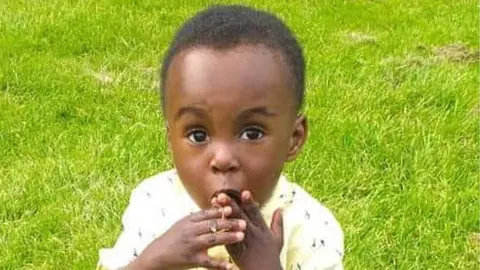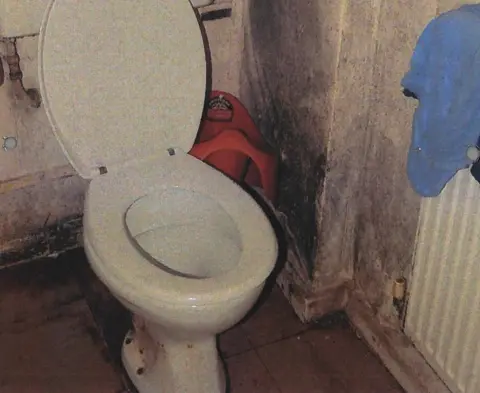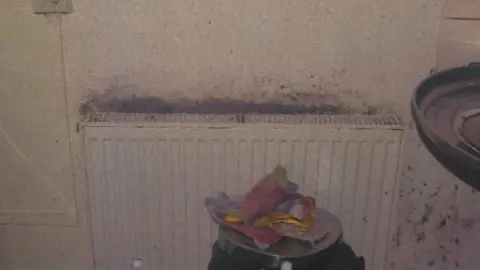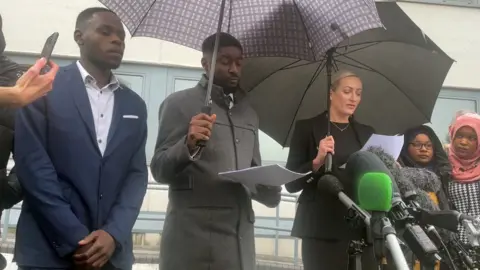Awaab Ishak: Mould in Rochdale flat caused boy's death, coroner rules
 family handout
family handoutA toddler died from a respiratory condition caused by exposure to mould in his home, a coroner has concluded.
Awaab Ishak's father repeatedly raised the issue with Rochdale Boroughwide Housing (RBH) but no action was taken.
Coroner Joanne Kearsley said RBH were not "proactive" and asked: "How in the UK in 2020 does a two-year-old child die as a result of exposure to mould?"
Awaab's family said RBH needed to "stop being racist" and provide fair treatment to people moving to the UK.
In a statement, they said their lives "changed forever" when Awaab died in December 2020, and they had been "left feeling absolutely worthless at the hands of RBH".
"We cannot tell you how many health professionals we've cried in front of and RBH staff we have pleaded to, expressing concern for the conditions ourselves and Awaab have been living in," they said.
"We shouted out as loudly as we could, but despite making all of those efforts, every night we would be coming back to the same problem."
They also called on RBH to "stop providing unfair treatment" to migrants, refugees and asylum seekers.
They said they had "no doubt at all that we were treated this way because we are not from this country and less aware of how the systems in the UK work".
RBH chief executive Gareth Swarbrick responded by saying his organisation would continue to "learn hard lessons".
He said the business would always support the "diverse communities of Rochdale".
 Greater Manchester Police
Greater Manchester PoliceRochdale Coroner's Court heard Awaab's father Faisal Abdullah - who came from Sudan to live in the UK in 2016 and was joined by his wife Aisha Amin a year later - reported mould developing in the one-bedroom flat to RBH in 2017 and was told to paint over it.
The following year, Awaab was born prematurely at 31 weeks, but there had been no concerns from any health professionals about his development.
In June 2020, Mr Abdullah instructed solicitors and initiated a claim over the recurring mould issue, but policy meant any repairs would not be done until an agreement had been reached.
The court heard Awaab was taken to Rochdale Urgent Care Centre on 19 December that year suffering shortness of breath and transferred to Royal Oldham Hospital before being discharged.
He deteriorated the next day and his parents were advised by the community children's nursing team to take him back to the urgent care centre.
He then went into respiratory arrest and cardiac arrest while being transferred to hospital and died after arriving there.
 Greater Manchester Police
Greater Manchester PoliceDelivering a narrative conclusion, the Manchester North senior coroner said ventilation in the one-bedroom flat was not effective.
"This was a direct contributing factor in the development of the mould," Ms Kearsley said.
"It is acknowledged by RBH and I find as a matter of fact that a more proactive response should have been taken to treat the mould which was present."
She added that Mr Abdullah had "some understanding and ability to converse in English", but his wife had "very little", a fact that was important as it impacted "the ability of professionals to engage in discussions with the family and the ability of the family to explain any worries or concerns they had and to understand advice".
The inquest also heard Awaab had consistently suffered from cold and respiratory issues throughout his life.
In September 2020, a community midwife had completed a special circumstances form to children's services highlighting concerns about the mould and potential impact on his health.
But Ms Kearsley said that document was not shared with the GP or health visitor and there was no evidence to show it was received by children's services or to show that "any action was taken".

How dangerous is mould?

Moulds are caused by too much moisture in a building and they emit spores which can cause a variety of health effects.
Some people are particularly sensitive to them, such as babies and young children, older people and those with allergies or asthma.
For those with allergies, breathing in or touching mould spores can cause severe reactions, including asthma attacks, fever and shortness of breath, while for others, mould can bring on a runny nose, red or itchy eyes and irritated skin.
That's why the NHS say you're more likely to have respiratory problems, infections or asthma if you have damp or mould in your home and why the World Health Organization calls it a key element of indoor air pollution, and a major cause of illness and death worldwide.

In a statement read by solicitor Kelly Darlington after the inquest, Awaab's family said he had always been "full of smiles, he liked to joke and was full of life and laughter".
They said the past two years had been "gruelling" and his death had left "a huge void" in their lives.
They added that RBH needed to "stop discriminating, stop being racist, stop providing unfair treatment to people coming from abroad who are refugees or asylum seekers [and] stop housing people in homes you know are unfit for human habitation".
Mr Swarbrick said he was "truly devastated about Awaab's death and the things we got wrong".
"We know that nothing we can say will bring Awaab back or be of any consolation to his family," he said.
"We didn't recognise the level of risk to a little boy's health from the mould in the family's home [and] we allowed a legal disrepair process, widely used in the housing sector, to get in the way of promptly tackling the mould."
In response to the family's comments that RBH needed to "stop discriminating and stop being racist" against refugees or asylum seekers, he said: "As a community owned organisation we support the diverse communities of Rochdale.
"We are proud of the work we do with all our tenants."
He said Awaab's death "needs to be a wake-up call for everyone in housing, social care and health", adding: "We will take responsibility for sharing what we have learnt about the impact to health of damp, condensation and mould with the social housing sector and beyond."
 PA Media
PA MediaThe coroner said she will be writing a report for the prevention of future deaths and will write to the minister for housing, and Health Secretary Steve Barclay, to raise issues.
Prime Minister Rishi Sunak's deputy spokeswoman said Awaab's death was clearly "a tragic case" and the "circumstances in which he died were unacceptable".
Housing Secretary Michael Gove echoed those words and said he had summoned Mr Swarbrick to his department "in order to explain to me why it was that this tragedy was allowed to happen".
He said "beggars belief" Mr Swarbrick still had his job and accused him of "hiding behind procedure", adding that he had "a lot of explaining to do".
"He's responsible for homes in which a young child died as a result of his failure and his team's failure to deal effectively with the situation," he said.
He added that the case had "shone a light on what needs to change in social housing" and the government was going to bring forward housing legislation so there would be "no hiding place for poor landlords".
Rochdale Borough Council's cabinet member for housing Danny Meredith said the "appalling state" of the family's home and the "indifferent response" to their pleas for help were "shaming and have raised serious questions for our largest social housing provider".
He said he would write to Mr Swarbrick to outline the council's concerns and continue to monitor RBH's reaction to the case "and their ongoing performance in relation to repairs and complaints".

Why not follow BBC North West on Facebook, Twitter and Instagram? You can also send story ideas to [email protected]
